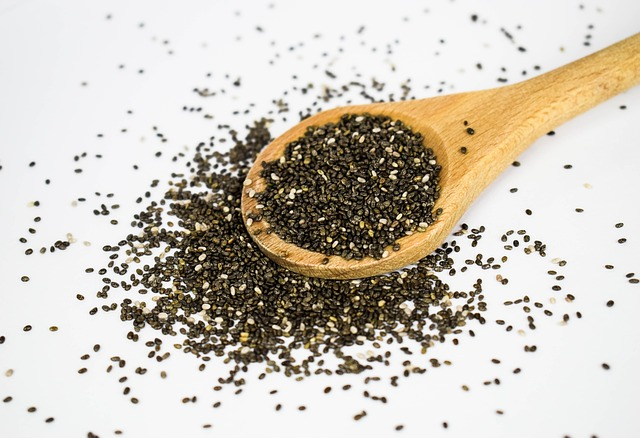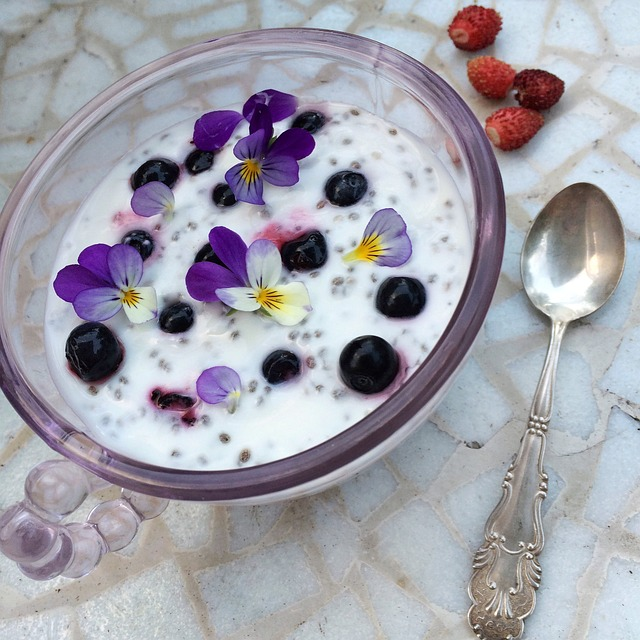Uncovering the Incredible Health Benefits of Chia Seeds
Chia seeds have taken the health world by storm recently with seemingly endless potential for helping to improve our wellbeing. In this article, we will examine the incredible health benefits of chia seeds and uncover just how effective these tiny seeds can be for maintaining a healthy lifestyle.
We’ll cover a wide range of topics, including the potential roles they can play in assisting with weight management, boosting energy levels, improving heart health and much more. So, if you’re looking to learn more about the power of chia seeds, read on!
What Are Chia Seeds?

Chia seeds have been used as a nutritional powerhouse since ancient times. The seeds are derived from the flowering plant salvia hispanica, which is native to Central and South America. The plant was cultivated as early as 3500 BC by the Aztec and Mayan civilizations, who used the seeds as fuel while running long distances or during battle. Chia seeds are now being commercially cultivated in multiple countries, such as Mexico, Guatemala, Peru, Argentina, Australia and the United States. This shows how popular they have become nowadays.
Chia seeds have a mild, nutty flavor and are packed with nutrition. They contain an impressive amount of omega 3 fatty acids, dietary fiber, protein, antioxidants, and a variety of other vitamins and minerals. In addition to their nutritional value, chia seeds can absorb up to 12 times their weight in liquid, making them an ideal ingredient for creating chia pudding, baked goods, and other recipes.
Harvesting chia seeds is a simple process. When the flower heads are ready, they can be picked and placed in paper bags to allow them to dry. Once dried, the seeds should separate from the plant and can be collected. The chia gel created when the seeds are mixed with liquid can also be used in recipes, and the sprouts can be eaten raw or cooked.
Chia seeds may be small, but they pack a powerful nutritional punch. With the right preparation and use, these tiny seeds can be a great addition to any diet. By controlling blood sugar levels and providing essential vitamins and minerals, chia seeds may provide many health benefits. The exact amount of chia seeds to eat depends on individual dietary needs and preferences, but typically, a daily intake of one to two tablespoons is recommended.
Nutrition Facts
Chia seeds are a nutritional powerhouse, offering an array of essential nutrients to your diet. Packed with fiber and protein, plus omega-3 fatty acids and micronutrients, one ounce (28 grams) contains 140 calories, 5 grams of protein, 10 grams of fiber, 12 grams of carbohydrate and 9 grams of fat – 8 being heart-healthy fats. Plus calcium and phosphorus for bone health!
A perfect addition to any diet due to its macronutrient profile; two tablespoons (25g) provide almost nine grams of dietary fiber while one ounce offers 18% RDA for calcium and 30% RDA for manganese. Chia seeds are also rich in essential amino acids, but not enough to be considered a complete source on their own.
Comparing chia seeds’ nutrition value against other foods like flaxseeds or basil reveals they contain more protein, fiber and fat than either option per ounce. Not only that, but consuming them can help prevent blood sugar spikes as well as reduce high blood pressure thanks to the abundance of polyunsaturated fatty acids present in them too!
In conclusion, chia seeds are incredibly nutritious food providing numerous health benefits when consumed regularly. Their versatility makes them easy to add to dishes such as yogurt or smoothies – even replacing eggs when mixed with water & fresh fruit!
Benefits
Chia seeds have many health benefits, and research suggests that consuming them regularly can provide numerous advantages. Packed with dietary fiber and protein, chia seeds are also a great source of calcium, manganese, phosphorus and omega-3 fatty acids. But what else do they offer?
For starters, the high fiber content in chia seeds helps to reduce appetite while stabilizing energy levels between meals. This is because it may help reduce ghrelin – the hormone responsible for stimulating hunger. Adding chia seeds to a high-sugar diet can also prevent changes in blood sugar and lipid levels. Eating bread containing these tiny superfoods may even lower post-meal rises in blood sugar among healthy adults compared to bread without them!
Chia’s soluble fiber content works wonders too; it helps reduce cholesterol levels while keeping arteries clear. The ALA or alpha linolenic acid found in chia has been linked to decreased heart disease risk as well as lower triglycerides – making it an ideal food for promoting heart health by reducing inflammation and lowering blood pressure.
The antioxidants present in chia fight free radical damage which leads to aging and diseases like cancer; plus they help reduce inflammation which reduces risk for chronic diseases such as heart disease. Iron from these little powerhouses promotes circulation of oxygen-rich blood throughout the body, providing critical support for cognitive function too! Calcium & phosphorus promote good bone mineral density preventing osteoporosis while zinc protects against dental & oral health issues like tartar build up on teeth & bad breath germs! Finally, eating chia seeds aids digestive health due to its high fiber content, helping promote regularity while fueling beneficial bacteria within our gut!
In conclusion, Chia seeds are nutritional powerhouses offering numerous benefits including weight loss aid, improved energy levels & reduced risk of chronic diseases such as heart disease all while promoting healthy bones & aiding digestion – so why not add some into your daily routine today?
How to Use
Chia seeds are a nutritional powerhouse, bursting with protein, fiber, antioxidants and omega-3 fatty acids. Native to Mexico and Guatemala, these tiny seeds from the mint family can be purchased in whole or ground form – perfect for adding to smoothies, juices, milk and more!
But how much should you consume? It’s recommended to have 1-3 tablespoons of chia seeds per day. For those with sensitive taste buds who don’t want their dishes altered by flavor – fear not! Chia seeds are mild enough that they won’t change the taste of your food. Plus they make a great egg substitute when mixed with water: just one tablespoon of whole chia seeds (or two teaspoons of ground) plus three tablespoons of water will do the trick!
When it comes to getting all the health benefits out of chia seeds though, start small and gradually increase as tolerated. Too much too soon could cause discomfort in your digestive tract so take it slow at first. And remember: always buy organic whenever possible and store them in a cool dry place for maximum freshness.
Chia Seeds are an amazing way to add nutrition into your diet without compromising on flavor or texture – so why not give them a try? With proper preparation, you’ll be able to enjoy all their health benefits while still enjoying delicious meals every day!
Risks and Side Effects
Consuming chia seeds may offer numerous health benefits, but there are potential risks and side effects to consider. Have you ever taken medication for high blood pressure or diabetes? Eating a lot of chia seeds can be dangerous – it can cause a sudden drop in both blood pressure and blood sugar levels. People should also be aware of the possibility of experiencing an allergic reaction to chia seeds; symptoms such as vomiting, diarrhea and itching of the tongue or lips can make life unpleasant. Although not common, it is important to stop consuming them if any new symptoms appear after eating them and speak with a doctor.
Chia seeds are high in fiber, so consuming large amounts could lead to stomach discomfort – start small and increase gradually as your body gets used to it! Another risk associated with eating chia seeds is choking; when dry chia seeds come into contact with saliva they swell up and become gelatinous which can get stuck in the throat. To avoid this, soak the chia seeds in water before eating them. Rapidly increasing your intake of fiber could have a significant impact on digestion leading to temporary side effects like bloating or gas – if persistent decrease your intake of chia seed consumption and discuss any concerns with a doctor.
Finally, although rare, those with severe allergies may be at risk of anaphylaxis from consuming these tiny powerhouses while people suffering from inflammatory bowel disease should limit their consumption due to their high fibre content.
In conclusion, even though they may offer numerous health benefits, it’s important to be mindful that there are potential risks associated with consuming chia seeds – discuss any concerns you have about using them with your doctor first!
Summary
Our research into the health benefits of chia seeds has revealed what a nutritional powerhouse these tiny, unassuming superfoods can be. Chia seeds are high in omega 3 fatty acids, dietary fiber, protein, antioxidants and other vitamins and minerals, making them an incredibly nutritious food to add to your diet. Eating chia seeds is beneficial for heart health, cholesterol levels, weight loss, energy levels, and aiding in digestive health, with one to three tablespoons recommended daily.
Despite their numerous health benefits, you should also be aware of potential side-effects; they might cause allergic reactions, digestive discomfort, or even choking if not taken in moderation.
Overall, chia seeds offer a multitude of health benefits and make an excellent addition to any modern diet. As part of a healthy lifestyle that includes proper nutrition and regular exercise, you can utilize chia seeds to help improve overall wellbeing and boost your body’s defenses.
In conclusion, chia seeds are a simple, natural way to reap powerful health benefits and lead a happier, healthier life.
Frequently Asked Questions
How many chia seeds should i eat a day?
It is recommended to consume 20 grams (about 1.5 tablespoons) of chia seeds two times per day for adults. For children and teens ages 5 to 18 years, the recommended amount of chia seeds is 1.4 to 4.3 grams daily.
Pay close attention to your serving size and drink plenty of water to avoid any digestive side effects.
What happens if i eat chia seeds everyday?
Eating chia seeds on a daily basis can provide health benefits, such as improving digestion and lowering blood pressure.
However, individuals with preexisting medical conditions and allergies should exercise caution when adding chia seeds to their diet and talk to their doctor before doing so.
Does chia seeds really reduce belly fat?
Overall, there is research evidence to suggest that consuming chia seeds can help support weight loss when combined with an overall healthy diet and lifestyle changes. This could include reducing belly fat as part of a more general decrease in fat mass over time.
Chia seeds have been shown to reduce visceral fat, often referred to as ‘belly fat’, when combined with a healthy diet and regular exercise. Studies have suggested that adding chia seeds to a healthy eating plan and active lifestyle can be beneficial for weight loss and reducing belly fat.
Can we drink chia seeds in water daily?
Overall, it is considered safe to drink chia seed water in moderation. However, since its high fiber content could lead to digestive issues, it’s best to pay attention to your body and start with small servings.
Ultimately, chia seed water can be included in a balanced diet for its potential health benefits. It is safe to include chia seeds water as part of a healthy daily diet, as long as it is done in moderation. Consuming too much may lead to digestive distress, so it is best to consume one serving (2 tablespoons) daily and make sure to pay attention to your body.
How much chia seeds should you eat a day?
It is recommended that adults consume between 15 and 20 grams (2 to 3 tablespoons) of chia seeds daily. Children and adolescents should aim for 1-4.3 grams (1-2 teaspoons) each day.
By incorporating chia seeds into your diet, you can potentially experience increased benefits like improved health, weight-loss, and enhanced energy.









